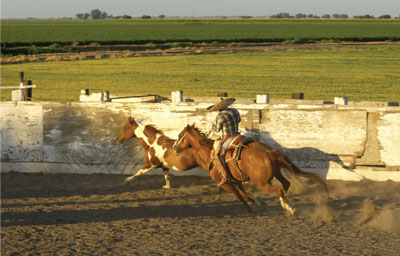Horse tripping a new welfare concern
The AVMA has come out against the practice of horse tripping, which involves roping the front or hind legs of a galloping horse while on foot or horseback, causing it to trip and fall for entertainment purposes.
The AVMA Executive Board approved a policy in April, recommended by the AVMA Animal Welfare Committee, that reads as follows:
AVMA POLICY
Horse Tripping
The AVMA opposes tripping, injuring or causing the death of horses, mules and donkeys for any entertainment purpose or during the training of such equids for any entertainment purpose.
Horse tripping, a long-standing tradition in Mexican-style rodeos (“charreadas”), has been on the Association’s and the American Association of Equine Practitioners’ radar the past few years after AVMA and AAEP members voiced their concerns about the practice.
The practice has been banned in 11 states, including Texas, California, New Mexico, and Arizona. However, attempts to circumvent animal cruelty regulations continue at county and local events, according to the AVMA Animal Welfare Committee. The three events during a charreada that include horse tripping are as follows:
- “Piales en lienzo”: roping the hind legs of a horse.
- “Manganas a pie”: roping the front legs of a horse while on foot.
- “Manganas a caballo”: roping the front legs of a horse while on horseback.
Points are awarded for how quickly the “charro,” or roper, can rope the horse.

Reported horse injuries include lacerations, dislocated joints, fractured bones, and teeth, neck, and shoulder injuries. Additional concerns that have been expressed are that the horses used for these rodeos are underfed, overused, and repeatedly roped until lame, sometimes with rope burns down to the bone.
The Professional Rodeo Cowboys Association and the National Professional Rodeo Association have prohibited the intentional tripping of horses at their sanctioned events. The Charro Federation USA, which oversees larger charreadas, has penalties for charros who trip horses.
An AAEP contingent of Drs. Jeff Blea, president, and Jerry B. Black, Tom Lenz, and Doug G. Corey attended a charreada put on by the Charro Federation USA this past fall in Pico Rivera, Calif. Dr. Blea said he was impressed with their horsemanship and care for horses, but added, “But I’m not naive. I’m sure some of this horse tripping that’s alleged does go on in smaller, unsanctioned events by associations not as well organized and attuned to welfare” as the Charro Federation USA.
In February, the AAEP board of directors approved a new position on the use of equids in entertainment that included the AAEP’s opposition to horse tripping.